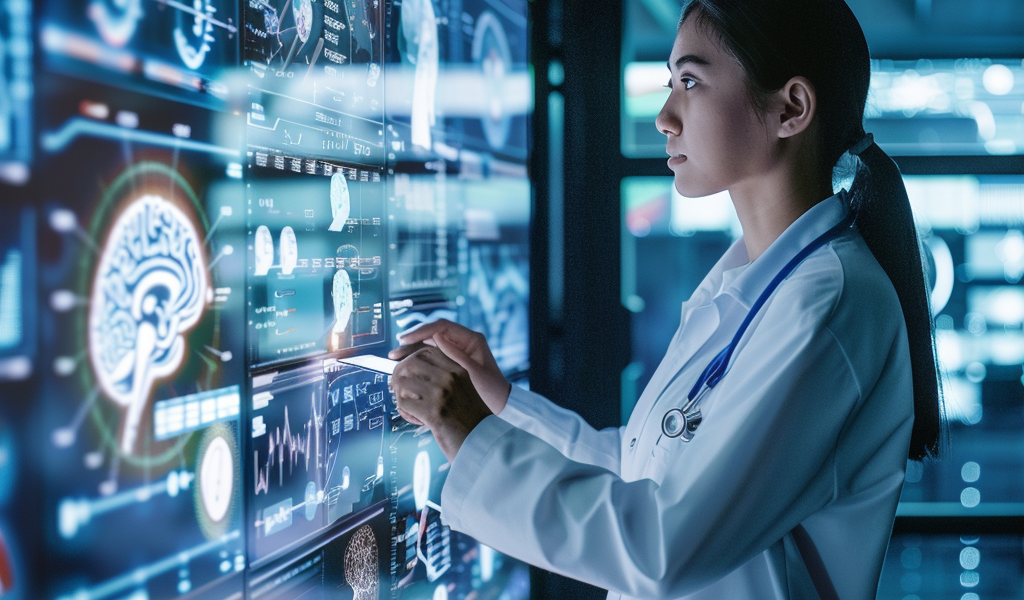In a groundbreaking development, the world of artificial intelligence is experiencing rapid advancements that are reshaping various industries. From healthcare to finance, AI technology is proving to be a game-changer, enhancing efficiency and accuracy in numerous applications.
One of the most significant impacts of AI is evident in the healthcare sector. Medical professionals are increasingly utilizing AI-driven tools to analyze patient data, leading to improved diagnostic accuracy. For instance, algorithms can now process vast amounts of medical records and imaging data to identify patterns that may be overlooked by human eyes. This not only accelerates the diagnostic process but also helps in early detection of diseases, ultimately saving lives.
Moreover, AI is revolutionizing personalized medicine. By analyzing genetic information alongside lifestyle factors, AI systems can provide tailored treatment plans for patients, significantly increasing the chances of successful outcomes. This shift towards personalized healthcare is empowering patients and allowing for more targeted therapies.
In the financial realm, AI is transforming how institutions manage risk and make investment decisions. Financial analysts are leveraging machine learning algorithms to predict market trends and assess creditworthiness with unprecedented accuracy. This has led to more informed decision-making and reduced the likelihood of financial crises, as institutions can better anticipate market fluctuations.
Furthermore, AI chatbots are enhancing customer service experiences across various sectors. These intelligent systems can handle a multitude of inquiries simultaneously, providing instant responses to customer questions and concerns. This not only improves customer satisfaction but also allows human representatives to focus on more complex issues that require personal attention.
Retail is another industry witnessing the benefits of AI technology. Retailers are using AI to analyze consumer behavior, optimize inventory management, and personalize marketing strategies. By understanding customer preferences and shopping patterns, businesses can offer tailored recommendations, ultimately driving sales and enhancing customer loyalty.
Transportation is also being transformed by AI innovations. Self-driving cars, powered by sophisticated algorithms, are set to revolutionize how we commute. These vehicles utilize a combination of sensors and AI to navigate roads safely, potentially reducing traffic accidents and improving overall road safety.
As AI continues to evolve, ethical considerations are becoming increasingly important. The potential for bias in AI algorithms raises concerns about fairness and accountability. It is crucial for developers and organizations to ensure that AI systems are designed with inclusivity in mind, preventing discrimination and promoting equitable outcomes.
Moreover, the integration of AI in the workplace is prompting discussions about the future of jobs. While AI can automate repetitive tasks, there is a growing need for human skills that cannot be replicated by machines. The workforce must adapt to these changes by focusing on creativity, emotional intelligence, and complex problem-solving abilities.
Governments and regulatory bodies are also taking steps to address the implications of AI technology. Policymakers are exploring frameworks that balance innovation with ethical considerations, ensuring that AI advancements benefit society as a whole. This includes investing in education and training programs to equip individuals with the skills necessary to thrive in an AI-driven world.
In conclusion, the rapid advancements in artificial intelligence are transforming industries and reshaping how we live and work. From healthcare to finance, AI is enhancing efficiency and accuracy, paving the way for a future where technology and human capabilities coexist harmoniously. As we navigate this evolving landscape, it is essential to address ethical considerations and prepare for the changes that lie ahead.





